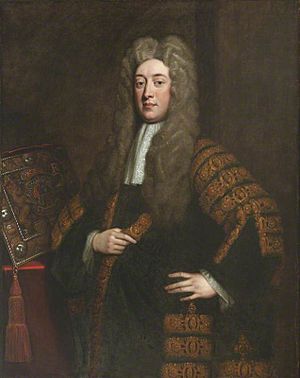Simon Harcourt, 1st Viscount Harcourt facts for kids
Quick facts for kids
The Viscount Harcourt
|
|
|---|---|

Portrait by Godfrey Kneller
|
|
| Lord Keeper of the Great Seal | |
| In office 19 October 1710 – 7 April 1713 |
|
| Monarch | Anne |
| Preceded by | In Commission |
| Succeeded by | himself as Lord High Chancellor |
| Lord High Chancellor of Great Britain | |
| In office 7 April 1713 – 21 September 1714 |
|
| Monarch | Anne George I |
| Preceded by | himself as Lord Keeper |
| Succeeded by | The Lord Cowper |
| Personal details | |
| Born | c. 1661 |
| Died | 29 July 1727 |
| Nationality | English |
| Political party | Tory |
| Education | Pembroke College, Oxford |
Simon Harcourt, 1st Viscount Harcourt (December 1661 – 29 July 1727) was an important English politician. He was a member of the Tory party. Harcourt served in the English and British House of Commons from 1690 to 1710.
Later, he was given the special title of Baron Harcourt in 1711. This meant he could sit in the House of Lords. He became Queen Anne's Lord High Chancellor of Great Britain. He also helped arrange the union between England and Scotland. Harcourt played a part in the talks before the Peace of Utrecht treaty.
Contents
Early Life and Education
Simon Harcourt was born in December 1661. His family lived in a place called Stanton Harcourt in Oxfordshire. His father was Sir Philip Harcourt. His mother was Anne Waller.
Becoming a Young Lawyer
Simon went to school in Shilton, Oxfordshire. Later, he studied law at the Inner Temple in London. In 1677, when he was 15, he went to Pembroke College, Oxford. He earned his first degree in 1679. By 1683, he became a lawyer, which is called being "Called to the Bar".
He had many brothers and sisters from his father's second marriage. When his father passed away in 1688, Simon inherited the family's lands.
Harcourt's Political Journey
Simon Harcourt started his public career in Abingdon. He was a recorder, which is a type of judge, from 1687. After a short break, he returned to this role in 1689.
Serving in Parliament
In 1690, Harcourt was elected as a Member of Parliament for Abingdon. He was a member of the Tory party. In 1701, he helped with the impeachment of Lord Somers. An impeachment is when a public official is accused of a serious crime.
Key Roles in Government
In 1702, Queen Anne made him the Solicitor-General. This is a senior legal advisor to the government. She also made him a knight. That same year, he received a special law degree from Oxford University.
In 1705, he became an MP for Bossiney. He was also a commissioner, helping to arrange the union with Scotland. This union created Great Britain. In 1707, he became Attorney-General. This is another very important legal role. However, he resigned in 1708 when his friend Robert Harley was removed from office.
Rising to Lord Chancellor
In 1710, Harcourt defended Henry Sacheverell in a famous trial. Later that year, he was elected MP for Cardigan. He then became Attorney-General again. In October 1710, he was appointed Lord Keeper of the Great Seal. This meant he was in charge of the Great Seal of the United Kingdom.
On 3 September 1711, he was given the title of Baron Harcourt. This allowed him to sit in the House of Lords. In April 1713, he became the Lord High Chancellor. This was the highest legal position in the country.
Harcourt bought the Nuneham Courtenay estate in Oxfordshire in 1710. But he usually lived at Cokethorpe. Queen Anne even visited him there once.
After Queen Anne's Reign
Harcourt played a big part in the talks for the Peace of Utrecht. This treaty ended a major war in Europe. When George I became king, Harcourt lost his job. He then retired to Cokethorpe.
He enjoyed spending time with famous writers like Swift, Pope, and Prior. They were often his guests. Swift sometimes called him "Trimming Harcourt" during their arguments.
In 1717, Harcourt helped to prevent the impeachment of his friend Lord Oxford. In 1723, he helped another friend, Lord Bolingbroke, get a pardon.
In 1721, Harcourt was given an even higher title, Viscount. He also rejoined the Privy Council. He served on the Council of Regency several times when the King was away.
Personal Life and Family
Simon Harcourt was known for being a great speaker. Many people said he was one of the best orators of his time. He was part of a famous club called the Saturday Club. This club was where many important writers and thinkers met. He exchanged letters with Pope, and some of these letters are still kept today.
Harcourt married three times. His first wife was Rebecca Clarke. They had five children together:
- Simon Harcourt (1684–1720) who was also a Member of Parliament. He passed away before his father. He had a son named Simon Harcourt, 1st Earl Harcourt.
- Philip Harcourt, who died young.
- Anne Harcourt, who married John Barlow.
- Arabella Harcourt, who married Herbert Aubrey.
Simon Harcourt passed away on 29 July 1727. He was buried at Stanton Harcourt.
 | Kyle Baker |
 | Joseph Yoakum |
 | Laura Wheeler Waring |
 | Henry Ossawa Tanner |

